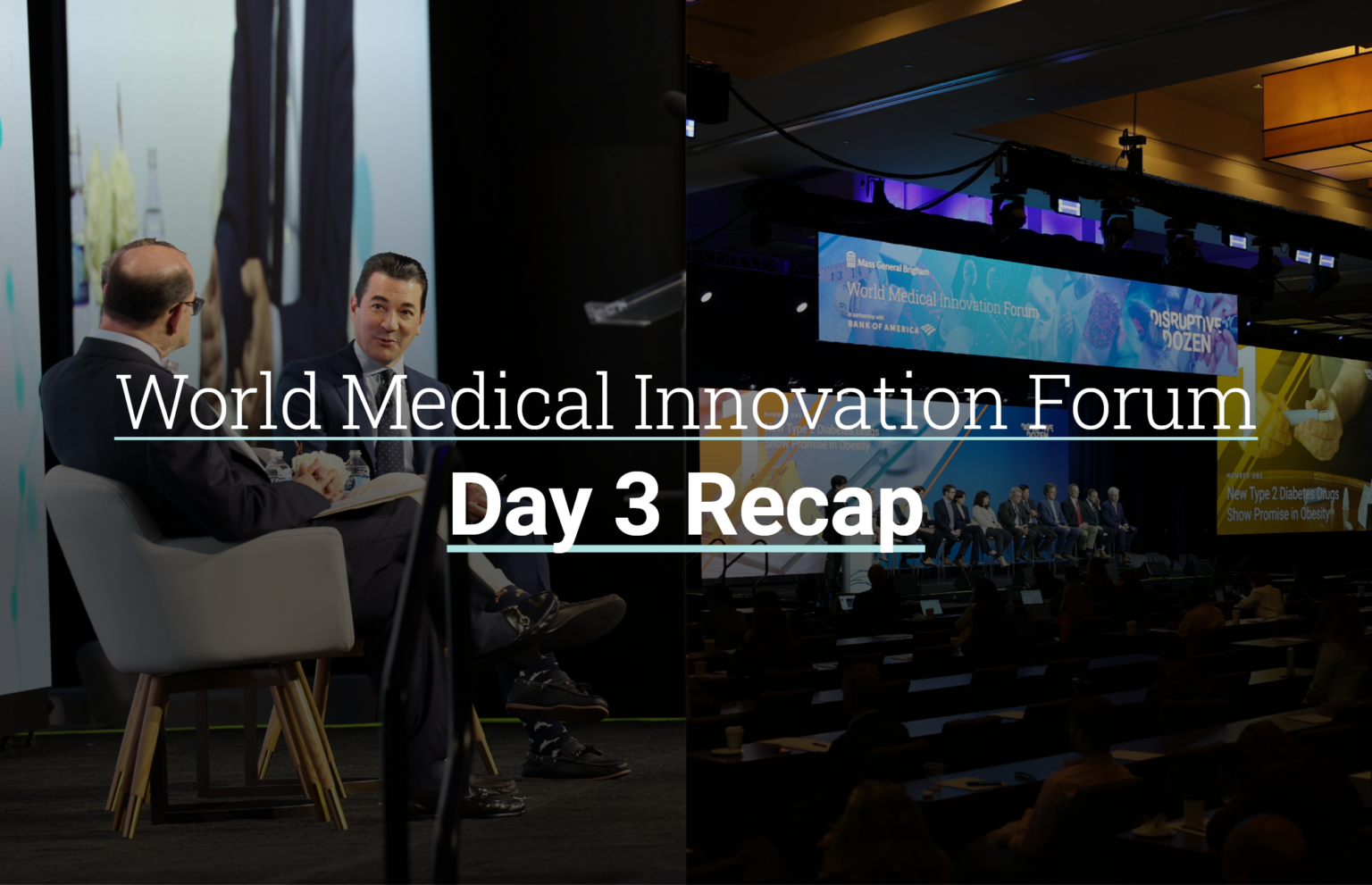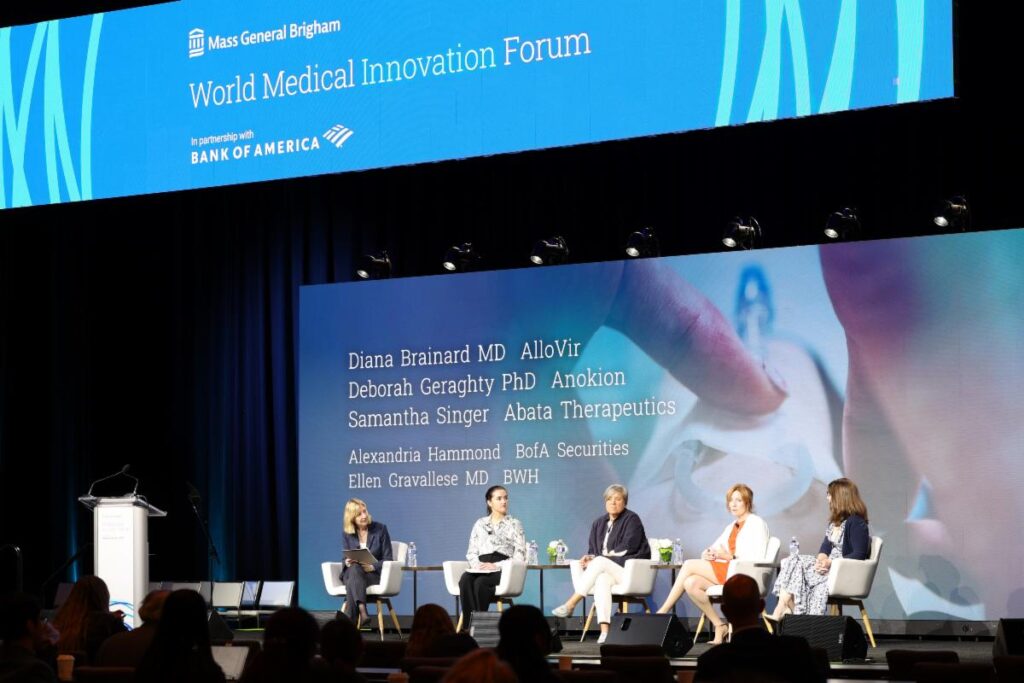WMIF MAIN SITE
2026 Event Site
Former FDA Commissioner Scott Gottlieb MD, was joined by moderators, Keith Kerman MD, Operating Partner & Senior Advisor of The Riverside Company, and Geoff Meacham PhD, Managing Director, Global Research at BofA Securities, to discuss the rapid acceleration of healthcare innovation and the corresponding regulatory environment needed to move new technology into clinical application. Gottlieb cited the progress being made in medical advancements and shared the observation that “the brain is the body’s last un-drugged organ,” and that there are tremendous opportunities to address debilitating brain diseases.
He projected that new Alzheimer’s drugs, Aduhelm and Leqembi, currently approved under a fast-tracked process, will be covered by Medicare only if physicians take on the work of monitoring outcomes to comprehensively follow how well patients fare on the medications – work that is generally considered administrative, but which is critical to tracking overall efficacy. He emphasized that ensuring access for all patients is tantamount. Gottlieb envisions a future where regulatory processes align with the technologies under review. In the area of AI, Gottlieb noted that trying to regulate complex algorithms under the current FDA system, which was designed for device and drug approvals, is sub-optimal. “We should be regulating the inputs rather than the outputs, and looking at the quality of the datasets, rather than trying to regulate use of the tool and whether it’s having the intended impact,” he explained.

Oral medications formulated using small molecule development that could replace injection- or infusion-only biologic drugs can help transform the way patients with certain autoimmune conditions are managed, said Natalie Holles, CEO of Third Harmonic Bio, which is working on treatments for severe asthma and chronic skin conditions such as urticaria.
Increasing patient access to these treatments is critical, and oral medications could offer a more convenient solution. “Dermatologists are not set up to give in-office injections, so a lot of patients with urticaria don’t receive therapies,” Holles said. “We think there’s an opportunity to transform the way these patients are managed.” Tariq Kassum MD, CEO, Celsius Therapeutics, also agreed that precision approaches are the future of I&I therapy.
Moderator Steve Greenberg MD, BWH neurologist spoke with Holles, Kevin Judice PhD, CEO & Founder of DICE Therapeutics, Rosana Kapeller MD, PhD, CEO of ROME Therapeutics, and Andre Turenne, Matchpoint Therapeutics CEO. The panel discussed the science of small molecules, how their companies choose what to focus on, how pricing may reflect more innovation in the field, and how such science will help improve patient care.
“I have an autoimmune disease and injecting a biologic every four weeks is literally a pain,” said Kapeller. With medications made with small molecule science, “You can have an arsenal of drugs with the ability to combine them, like treating cardiovascular disease. With small molecules, we will be able to bring price down, and it increase patient access to medications.”
Watch The Innovation Gap: Old Dog, New Tricks – Reprogramming the Immune System
Watch The Disruptors: Driving I&I Therapy Adoption with Oral Formulations
Chief Scientific Officer & President, Worldwide Research, Development and Medical at Pfizer, one of the companies that pioneered the COVID vaccine, Mikael Dolsten MD, PhD, spoke about how vaccines are a cornerstone of healthy aging.
“If you vaccinate early in life, you get a vigorous clonal response,” he said. “As you age, the response is usually less. It’s an investment in healthy aging by being able to train the immune system early.”
Vaccines continue to fight infections for all ages. The Food and Drug Administration (FDA) recently approved Pfizer’s vaccine to treat respiratory syncytial virus (RSV) in older adults; Dolsten said the vaccine, which is also transforming the severity of pediatric RSV illness, would help children and younger adults “be better prepared for healthy aging later on.”
Along with co-moderators Geoff Meacham, PhD, Managing Director, Global Research, BofA Securities and Vijay Kuchroo, DMV, PhD, the Director of Evergrande Center for Immunologic Diseases, the group discussed other aspects of healthy aging including the concept of “healthspan,” which reflects not only the length of life, but its quality.
Calling diabetes and obesity metabolic disorders “another pandemic,” Dolsten noted that GLP-1 medications were impressive for their ability to help people reduce hemoglobin A1c readings and body weight dramatically. By reducing weight and average glucose levels, patients may be able to prevent or slow age-related metabolic health issues such as cancers or neurodegenerative disease.
In the future, “it may be intriguing to look at your metabolic age at the doctor’s office,” he said. “If you have a young immune system, you will be more likely to be considered healthy. If it is fading, you may be monitored” for age-related disease so that preventive measures could be taken. “The future should be more about understanding your insides, and not at looking at a birth certificate from 50 years ago,” Dolsten said.
Watch Fireside Chat | Mikael Dolsten, MD, PhD

Celebrating advances in medications and technologies that are poised to make enormous impact by the end of 2024, Paul Anderson, MD, PhD, Acting Chief Academic Officer, Mass General Brigham, Lilit Garibyan, MD, PhD, Physician-Scientist, Wellman Center for Photomedicine, MGH, and Rudy Tanzi, PhD, Director, Genetics and Aging Research Unit, Co-Director, McCance Center for Brain Health, MGH, introduced 12 Mass General Brigham clinicians to comment this groundbreaking work.
“New type 2 diabetes drugs show promise in obesity” was voted the number 1 disrupting technology that will impact the future of healthcare. Gerard Doherty, MD, Surgeon-in-Chief, BWH presented findings on GLP-1 mimicking drugs that curb hunger that were initially developed to battle type 2 diabetes. Patients on this medication lost over 15% of their starting weight. This game-changing discovery could potentially address the surging global obesity population.
Click here for details on each of the Disruptive Dozen technologies, including video updates.
Join us in 2024 for the 10th Anniversary of the World Medical Innovation Forum! Stay tuned for updates on our website.